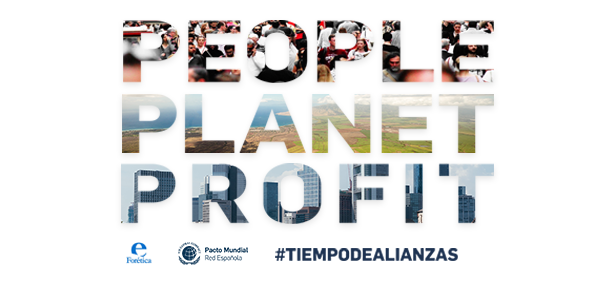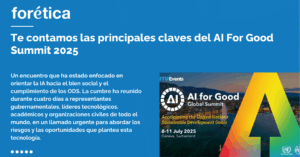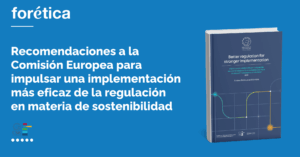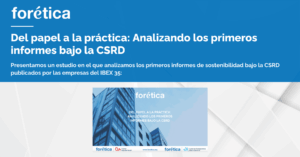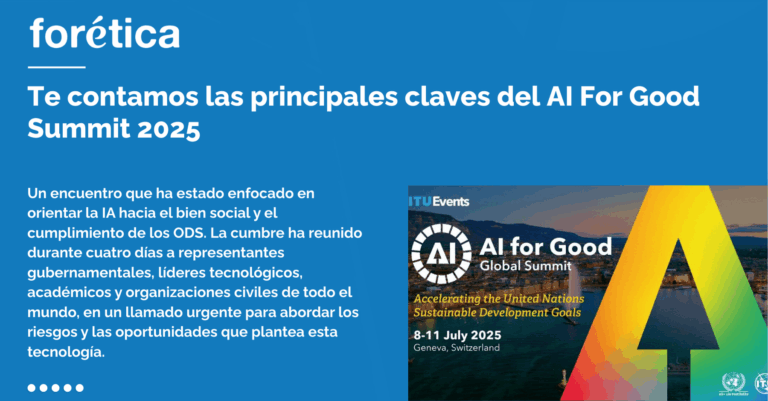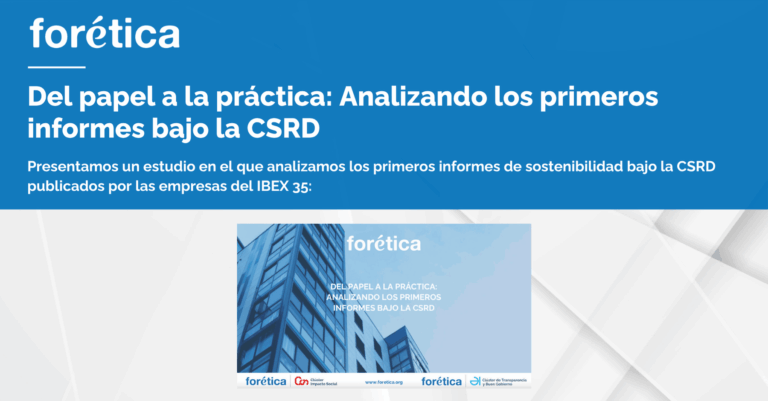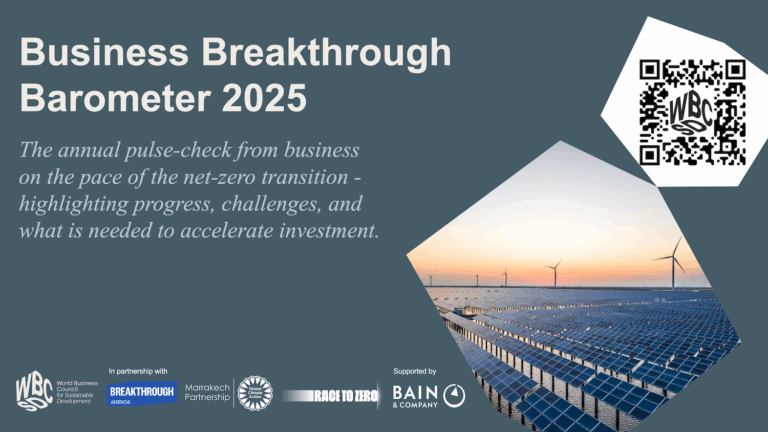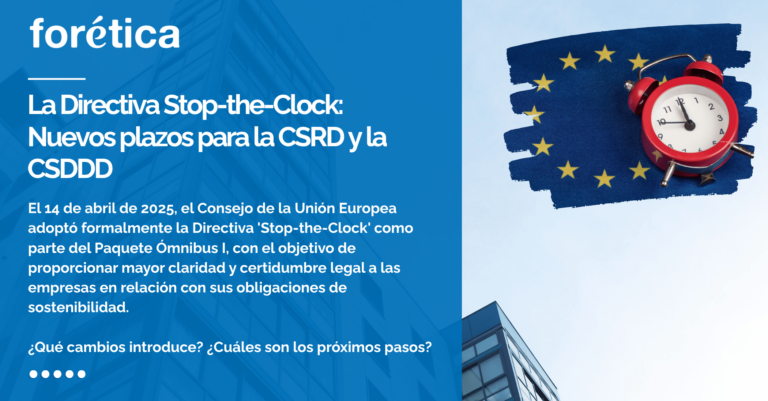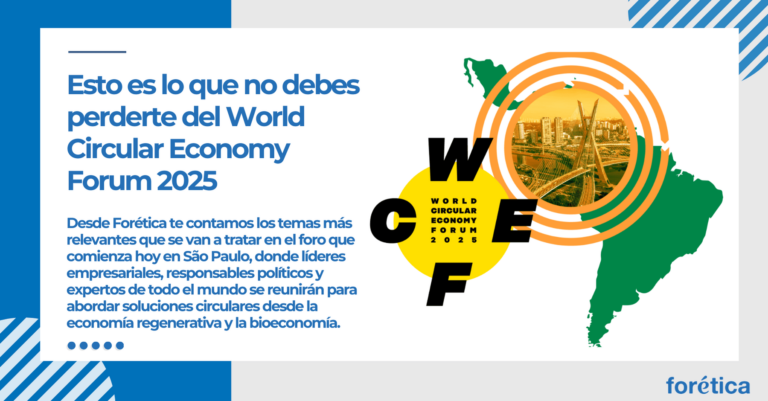Forética y la Red Española del Pacto Mundial han celebrado la sesión “People: el futuro del trabajo”, la primera dentro del ciclo de conferencias #TiempodeAlianzas, una iniciativa en la que las dos organizaciones impulsan la importancia de una recuperación de la crisis de la COVID-19 alineada con el desarrollo sostenible y la Agenda 2030.
La jornada ha sido inaugurada por Germán Granda, Director General de Forética, que ha destacado que la razón de ser de esta alianza es “impulsar a las empresas en avanzar en tres compromisos: la salud tanto de sus empleados como de otros grupos de interés; el fomento de la empleabilidad y el empleo decente y de calidad; y la lucha contra las desigualdades, promoviendo la inclusión y la diversidad.” Además, durante su discurso, Germán Granda ha aludido al carácter de oportunidad de esta crisis, declarando que “es momento de reiniciar la economía, colocando la sostenibilidad en el centro de las estrategias empresariales. Debemos trabajar por convertir esta crisis en una oportunidad hacia una recuperación verde.”
A continuación, ha intervenido la Directora Ejecutiva de la Red Española del Pacto Mundial Cristina Sánchez, que ha insistido en mantener durante esta recuperación el lema de la Agenda 2030 de “no dejar a nadie atrás” para lo que ha afirmado, es necesario que “ahora más que nunca las empresas han de poner a las personas en el centro de sus estrategias; considerando el bienestar de todas aquellas que se encuentren en su cadena de valor, desde los y las empleadas, a clientes, consumidores, proveedores y sociedad en general.” A lo que ha añadido que “las empresas de futuro, es decir, aquellas que serán viables y rentables en el largo plazo, serán las que sitúen a la sostenibilidad y el respeto por los derechos humanos como parte esencial de su modelo de negocio.”
Precisamente sobre el futuro de las empresas y el trabajo ha versado la intervención de Joaquín Nieto, Director General de la Organización Internacional del Trabajo (OIT) en España. Desde su posición, Nieto ha remarcado la necesidad de humanizar a las empresas, pensando también en los trabajadores que están sufriendo las consecuencias de la pandemia y ha destacado como dato que “en el mundo hay 3.000 millones de trabajadores y 1.600 de ellos han tenido que parar su actividad, quedándose absolutamente desprotegidos y pasando de la noche a la mañana a la pobreza más absoluta. Esto pone de relieve la necesidad urgente de contar con sistemas de protección social que palien los efectos negativos de este tipo de crisis tanto sobre las empresas como sobre las personas.” En este sentido, el director de la OIT ha alentado a todos los actores, empresas, organizaciones y gobiernos, a trabajar en alianza para lograr la Agenda 2030 y en especial en el ODS 3, referente a la salud, y en el ODS 1 sobre el fin de la pobreza, cuya meta 1.3 habla sobre los sistemas de protección social. En sus palabras: “Esta crisis supone un conjunto de esfuerzos y desafíos que pueden ser una oportunidad para que después de la pandemia vayamos a un mundo mejor con empresas más responsables y con trabajadores más protegidos.”
Otro de los aspectos que ha resultado clave durante la jornada, debido a su incidencia en el futuro de los modelos empresariales, es la transformación digital. Este tema ha sido abordado por Ricardo Trujillo, Responsable del Clúster de Impacto Social y de los programas Jobs 2030 y Upskill4Future de Forética. Ricardo Trujillo ha hablado sobre el enorme impacto que tendrá esta transformación sobre las personas y los puestos de trabajo que ahora conocemos y que podrán desaparecer para crear otros nuevos. Y en este punto ha aludido a la necesidad de “ampliar la formación a todas las generaciones para que puedan adquirir las nuevas habilidades y capacidades que se requerirán en esta transformación laboral”. Se trata de que, ante cualquier transformación y teniendo en cuenta que nos enfrentamos a un escenario de gran complejidad que dificulta el planteamiento de estrategias empresariales sostenibles a futuro, no olvidemos poner en el centro a las personas y sus necesidades de adaptación.
De hecho, tanto para promover la protección de las personas como para cumplir con la Agenda 2030, es fundamental que las empresas adopten un enfoque de derechos humanos en sus estrategias empresariales. Según Javier Molero, Director de Proyectos y Agenda 2030 de la Red Española del Pacto Mundial, “la conexión entre la Agenda 2030 y los derechos humanos es vital porque solamente a través de este enfoque se puede poner a las personas en el centro de las estrategias empresariales durante y después de la reconstrucción en la que nos encontramos inmersos.” Durante su ponencia, Molero ha destacado los impactos que está teniendo la pandemia de la COVID-19 en los derechos de las personas señalando, entre otras cifras, que “unos 700 millones de trabajadores vivieron en la pobreza extrema o moderada en 2018 y la OIT estima que la crisis de la COVID-19 puede destruir 305 millones de empleos en el mundo.” Por tanto, prosigue, “es fundamental que las empresas evalúen los riesgos o impactos de su actividad sobre los derechos humanos, lo que a su vez les dará la oportunidad de identificar áreas de contribución social de gran magnitud en la Agenda 2030.”
La jornada también ha contado con voces del ámbito empresarial. En concreto, han intervenido Anastasia de las Peñas, Directora de Experiencia de Empleado de Mapfre, y Loles Sala, Directora de Talento y Cultura de ManpowerGroup. Sobre el futuro de las empresas, de las Peñas, ha incidido en la importancia de la gestión de talento y del aprendizaje de la plantilla, que debe darse a lo largo de toda la vida laboral. Asimismo, ha hecho hincapié en la necesidad de contar con estructuras dinámicas, promover nuevas formas de trabajo como el digital workplace e invertir en la experiencia en el empleado. Respecto a esto último ha declarado que “es el poder transformador de las personas comprometidas con nuestro proyecto lo que va a determinar el éxito de la empresa. Por ello, tenemos que seguir siendo claramente humanos y seguir demostrando que tenemos vocación de ayudar a las personas.”
Por su parte, Loles Sala, Directora de Talento y Cultura de ManpowerGroup, ha señalado la importancia de “generar un pacto por el empleo y la empleabilidad. Debemos ser capaces de aunar las fuerzas de todos los actores para garantizar que somos capaces de sobreponernos al entorno y asegurar la sostenibilidad». Además, ha presentado las cinco palancas para abordar la transformación en el empleo: “Ser organizaciones ‘Talent Magnet’; la revolución de las competencias (Skills Revolution), ecosistemas híbridos de talento (Hybrid Talent Ecosystem), experiencia del talento (Talent Experience) y liderazgo de valor (Digital Leader)”.
La jornada ha sido clausurada por Vanesa Rodríguez, Directora de Comunicación y RRII de la Red Española del Pacto Mundial, que ha señalado tres grandes conclusiones: la primera, la importancia de poner a las personas en el centro de la recuperación, ya que han mostrado ser las más permeables a los efectos de la pandemia; la segunda, sobre la necesidad de promover el trabajo decente enmarcado en la Agenda 2030 y los derechos humanos; y la tercera, sobre aprovechar las ventajas de la transformación digital apostando además por la formación de las personas durante toda su vida laboral.

